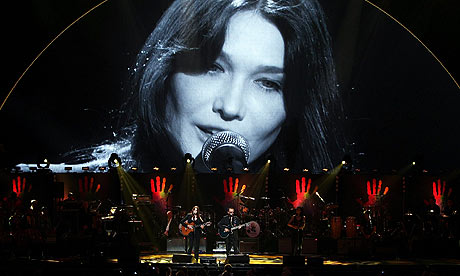
Nicolas Sarkozy's long-running battle to introduce one of the world's toughest laws against illegal downloading resumes today, as MPs debate the role of a government internet surveillance agency that critics call "Big Brother".
France's controversial anti-piracy law is the pet project of the president, supported by his singer wife, Carla-Bruni Sarkozy. The president argues that strict measures are needed to safeguard artists and the music industry from France's spiralling piracy culture.
The government has described France as the world's No1 in illegal music and film downloading, and one poll showed that more than a third of French internet users had illegally downloaded files.
The bill initially planned to introduce a new state surveillance agency, known by its acronym Hadopi, to monitor the public's internet activity. Web surfers repeatedly caught obtaining music, films or video games illegally would first be warned; thereafter the agency would have the power to cut off their web access for up to a year.
But in a blow to Sarkozy last month, the law was blocked and deemed unconstitutional by France's highest legal authority, which argued that internet access is a basic human right.
This week, the lower house of parliament will debate an amended version of the law: the Hadopi state agency will not be able to hand out punishment itself but must report offenders to a judge. In a fast-track court procedure, judges will decide whether the accused should have their internet account suspended for up to a year, face a €300,000 (£259,000) fine, or a two-year jail sentence.
If the law passes, individuals will also be found guilty of "negligence" if someone else uses their account for illegal downloads. They can be fined €1,500 and have their internet connection suspended for a month.
Sarkozy's ruling centre-right UMP party has said that the internet watchdog would not survey the public's private email accounts, dropping a plan to sanction web users for exchanging illegal files as email attachments.
The US and the rest of Europe are watching closely to gauge whether the law will be effective in cutting online piracy or helping to improve the fortunes of the record industry. But in France, the row has been heated, with singers and music executives lobbying government in favour of the bill, and civil liberties and consumer groups criticising what they deem draconian measures.
The country's most famous entertainers have taken sides. Catherine Deneuve and 30 young actors and directors signed a petition against what they called the government's Luddite approach and "missed opportunity". The singer Juliette Gréco and other French performers took aim at the French left for letting down the arts by opposing the bill.
The Socialist opposition intends to contest the bill by tabling numerous changes and stringing out this week's National Assembly debate for two days. The government hopes the bill will come into force in the autumn.

